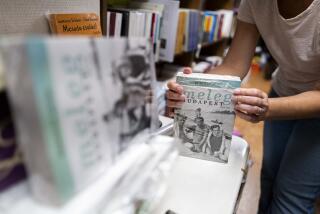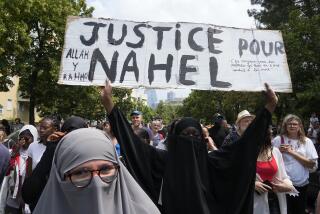Parisians flock to newsstands to buy new Charlie Hebdo issue
- Share via
Reporting from Paris — People made reservations days in advance and lined up before dawn, and still scores were turned away as they attempted to buy the latest issue of Charlie Hebdo on Wednesday, a week after Islamist extremists launched a deadly assault on the satirical magazine’s offices and began the worst terrorist attacks in Paris in decades.
Prime Minister Manuel Valls could be seen on French television toting a copy of the magazine, but others were not so lucky.
Some stores were mobbed with crowds reminiscent of Black Friday in the United States.
“We don’t have any more!” shouted the owner of a newsstand opposite the Port Royal train station, as dozens approached looking for the controversial magazine in the 5th Arrondissement.
Like many other newsstand operators, he had opened early, at 6 a.m. He received only 30 copies. By 8:30 a.m. he still had a few of the magazines, but said they were reserved for regular customers. He sold them quietly, slipping them into bags behind the counter and allowing regular customers to leave quickly, paying later.
For others, he pointed to a handmade sign that said “Sorry, no more Charlie Hebdo” in French and promised “Tomorrow.”
Michel Petitjean, 58, a researcher, was among those turned away -- for the third time, he said. He had already stopped at a newsstand that sold out at 6 a.m, and another that had a line of 30 people with copies reserved.
He said he wanted to buy the magazine “to support the staff of Charlie and for liberty.”
“Charlie Hebdo criticizes everything,” he said, “That shouldn’t be a death sentence.”
He said buying the magazine was also a way to defend free speech all over the world, not just in France.
“There are countries where they don’t have freedom of expression, even today,” he said as he stood in front of the newsstand.
The latest issue spares no one, reviving the magazine’s signature brand of bawdy political critique. Almost every page addresses some facet of the attacks with coarse humor, including plenty of drawings by some of the eight staffers killed.
One shows a masked attacker armed with an assault rifle, with a pencil stuck in his behind. The caption: “Our pencils will always be sharper than your bullets.”
Another shows two attackers arriving in heaven asking, “Where are our 70 virgins?” Those cavorting on a nearby cloud respond, “They’re with the Charlie Hebdo team, you losers!”
There is also a cartoon targeting those who have profited from the international groundswell of support for the magazine. “Meanwhile in Bangladesh,” it says, showing a sweatshop worker making a “Je Suis Charlie” T-shirt.
As usual, dirty jokes abound -- about Muslims, the Pope, French and other European politicians.
“One family of clowns decimated, 10 found,” reads one cartoon showing a crowd of French lawmakers including President François Hollande and former President Nicolas Sarkozy.
The editorials that accompany the cartoons are equally irreverent.
“For the past week, Charlie, an atheist newspaper, has been accomplishing more miracles than all of the saints and prophets combined,” wrote Gerard Biard, the magazine’s editor-in-chief.
But Biard was also reflective, defending his staff and their role as a bastion of free speech in France at a time when other publications have been accused of self-censorship and political correctness.
“In recent years, we’ve felt a little alone,” he wrote, recalling previous threats and attacks on the magazine, including a 2011 firebombing.
“We thank with all our heart those … who are really on our side, who, sincerely and profoundly, ‘are Charlie.’”
By the afternoon, 27,000 sites nationwide had sold out of the magazine, despite an initial print run of 3 million copies, compared with the usual 60,000. A version of the publication was available online, but many said they wanted a copy of the magazine and its cover cartoon showing the prophet Muhammad crying under the headline, “All is forgiven.”
The magazine said it would expand the run to 5 million.The issue has been translated into five languages and is being distributed in other countries for the first time.
Some Muslims objected to the cover; many consider any depiction of their prophet to be blasphemous.
A protest against the cartoon drew hundreds of people in the Philippines, where demonstrators in the southern town of Marawi burned a Charlie Hebdo poster and insisted that free speech did not include insulting the prophet, according to video and news reports.
In Turkey, a court barred the cartoon from being published on the country’s websites, but Cumhuriyet newspaper published a four-page spread that included the controversial cover. The paper’s editor, Utku Cakirozer, tweeted that it “has lost writers to terror attacks” and “understands the Charlie Hebdo massacre very well.”
A statement issued by the Muslim Council of Britain urged fellow Muslims to peacefully express their “justified displeasure at the mockery that is made of our faith.”
Muslim community leaders in France appealed for calm as the magazine hit the streets.
Sadli Dahar, 45, a building maintenance worker, was unable to buy a copy but said he planned to read the magazine online and try again Thursday.
He said his 8-year-old son attends school near the Charlie Hebdo offices, and that the students heard the gunfire during the Jan. 7 attack. Afterward, his son said school officials explained to them that the attackers had said they were avenging the prophet Muhammad.
His son’s response: “Can’t God handle that himself?”
Dahar, who moved to Paris 25 years ago from Algeria, described himself as a moderate Muslim who values Charlie Hebdo as an outlet for the type of provocative speech he could not allow himself without facing a backlash from the Muslim community, which he felt was being held hostage by extremists.
“I couldn’t say it -- but Charlie Hebdo could,” he said.
He said the attackers have emboldened him and other moderate Muslims to speak out against extremism.
“They succeeded in provoking a debate,” he said. “What they did was put this back on the table and enable the Muslim community to step up and speak out.”
Martine Blanche, 55, was among the few who managed to buy a copy of the magazine at Port Royal on Wednesday, after reserving a copy three days in advance.
When she approached the newsstand after 9 a.m., a few people were lingering, so the agent quietly asked her to pass her purse behind the counter, then slipped the copy in and told her to pay later, when she picks up her lunchtime copy of Le Monde.
It was the first time that Blanche, who works at a nearby office as a project manager handling French students’ financial aid, had bought the magazine.
“I bought it to support the newspaper, to say we are not afraid, and we support freedom of the press,” she said.
She said she had heard about potential protests in the Middle East in response to the magazine’s cover, but that Charlie Hebdo’s staff should not censor themselves. She had also heard about the Turkish newspaper that reprinted some of the Charlie Hebdo cartoons and called those staffers “very brave.”
“Everybody should,” she said. “It’s a risk, but even if there are risks, we cannot give up. People say it’s a fight, it’s a war. We cannot abandon the freedom of the press.”
At a nearby newsstand in the 6th Arrondissement, the owner had posted a common sign “Pas de Charlie,” and when people stopped to ask, he promised, “Tomorrow.”
Andre Mardukh, 65, said he had ordered 100 copies of the magazine Wednesday, but only received 20 and was flooded with customers.
He said he was not taking reservations for more copies Wednesday, even from regular customers, but planned to open early again on Thursday.
Mardukh, who is Iranian and Kurdish, said he talks to his customers about the attacks and the broader political situation in the Middle East, and that he expects to have more discussions in coming days.
Cashmira is a special correspondent.
Twitter: @mollyhf
More to Read
Sign up for Essential California
The most important California stories and recommendations in your inbox every morning.
You may occasionally receive promotional content from the Los Angeles Times.














